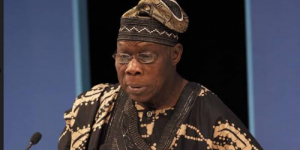
Obasanjo made this known during a discussion with 15 emerging African leaders at the Olusegun Obasanjo Presidential Library (OOPL).
Former President of Nigeria, Olusegun Obasanjo has claimed that his refusal to remain “silent” on pressing national and international issues led to his imprisonment under the military dictatorship of the late General Sani Abacha in 1995.
Obasanjo made this known during a discussion with 15 emerging African leaders at the Olusegun Obasanjo Presidential Library (OOPL).
The former President explained how his candidness became a liability during Abacha’s regime.
“My prison experience was one of the life challenges I faced, stemming from my inability to keep quiet,” Obasanjo said, stating the importance of addressing critical issues regardless of personal consequences.
This was contained in a statement by his Special Assistant on Media, Kehinde Akinyemi, where Obasanjo disclosed that his “determination” to rescue Nigeria from potential disintegration motivated his presidential bid in 1999.
Before that, he said he had retired to farming after his military service at age 42.
Addressing the youth under the aegis of the Future Africa Leaders Foundation, including winners of the prestigious Future Africa Leaders Awards, Obasanjo urged the next generation to adopt leadership values that prioritise the continent’s development.
The former President underscored the need for resilient leadership, noting that his journey from military service to the presidency was shaped by his willingness to confront adversity head-on.
“I joined the Army and retired as a military officer at 42,” he said.
“I was still young, energetic, and dynamic. So, I turned to agriculture. But during that time, I ended up in prison—not something I wanted. It happened because I refused to stay silent. I spoke out on issues that mattered, and that landed me in jail. That was a tough period. When I came out, the country was in a bad state. People felt the need for leadership, and pressure started mounting.”
Addressing the issue of African debts, Obasanjo criticised the recklessness and corruption behind some loans.
“Many of these debts cannot be justified. Some were outrightly corrupt,” he said, citing an example in Nigeria where a loan for a carpet factory was fully repaid despite the project never taking off.
He also commended Pastor Chris Oyakhilome, founder of the Future Africa Leaders Foundation, for hosting the 2024 edition of the programme.
Obasanjo urged the programme’s beneficiaries to lead by example.
“You are the leaders of today, not tomorrow. Use positive, disruptive actions to inspire, enrich, and uplift others.”
 DailyrecordNg …Nigeria's hottest news blog
DailyrecordNg …Nigeria's hottest news blog








